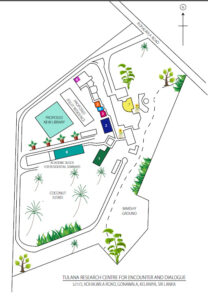VAGDEVI, JOURNAL OF RELIGIOUS REFLECTION
Origins
The Journal of Religious Reflection (JRR) is a publication of the Sri Lanka Province of the Society of Jesus and has been in print since December 2000, apart from a sixteen month hiatus between the Old Series and the New Series. Thirteen issues of the Old Series were published between December 2000 and August 2005. The New Series, with its subtitle VAGDEVI, was started in January 2007, and has continued as a bi-annual publication to date.
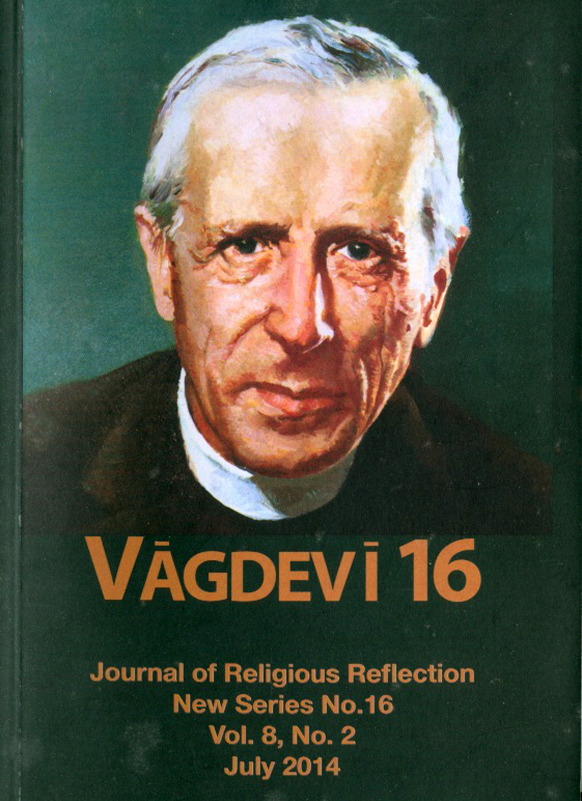
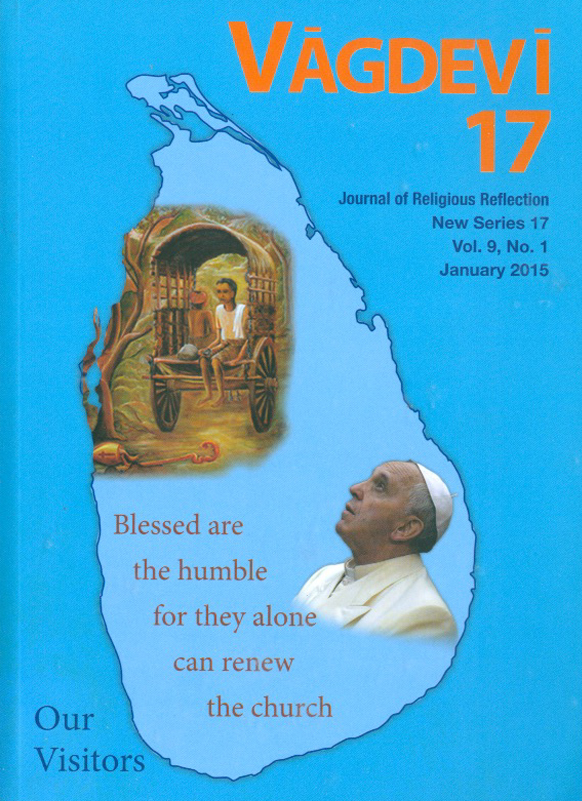
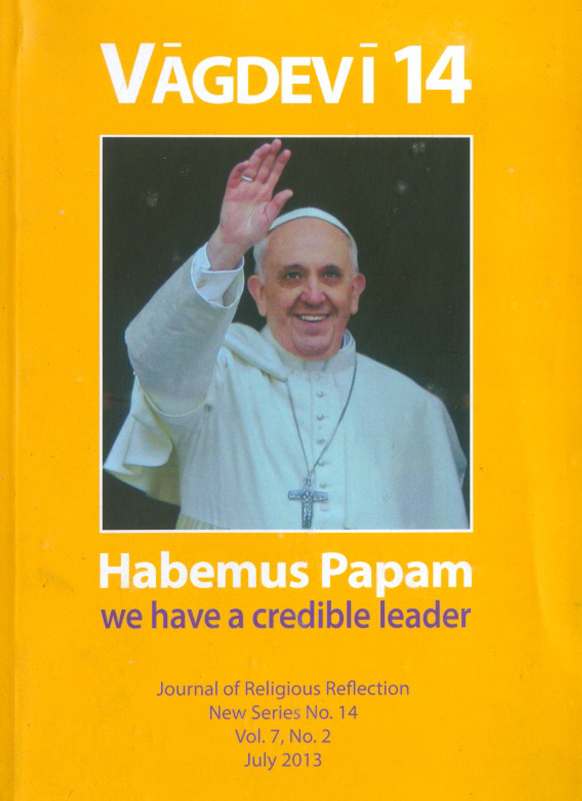
In his message for the inaugural issue of the Journal of Religious Reflection (JRR) of December 2000, the Jesuit Provincial at that time, Fr. Baylon Perera s.j. wrote the following;
“Art, literature and learning flourish in time of prosperity, peace and tranquility. However, theology and mysticism come to birth in a period of strife and struggle. In the one, it is man who expresses himself/herself; in the other, God. In the one, it is the grace of creation that is at work; in the other, the grace of redemption.
We, as a people, are experiencing the birth pangs of our identity as Sri Lankans. We aim at a national awareness where the lesser is reduced and absorbed. However, we hear the Lord calling us to surrender all that we are, to Him who fashions a “Kingdom” awareness, where individual identities are respected and integrated. It is time that we became conscious of His ways with us. It is time that some of us attempted to make sense of our milieu…. and touched the divine.
Many years have gone by, since we Jesuits made an option for Theological Reflection as a priority ministry in Sri Lanka. This seed, reviewed and repeated in annual assemblies, has fallen at last on good soil. We wish that, God willing, it yields a hundred-fold”.
In their Introduction to the first issue, the “pro-tem members of the Editorial Board” Frs. Paul Caspersz,s.j., Tom Kuriacose,s.j., and Chryso Pieris, s.j. wrote;
“What is here attempted is not merely an introduction to one issue of the Journal of Religious Refection but, since this is the inaugural issue, an introduction to the journal itself.
“And first, of course, why a journal of Religious Reflection? Our initial answer is that the Journal is a response to an intention at various times expressed in our Province, after the Province was formed by the amalgamation of the two separate Jesuit Missions of Galle and Batticaloa-Trincomalee in 1962. The intention was that, at least after the transfer of the Papal Seminary from Ampitiya in Sri Lanka to Pune in India in 1955, we needed to have a forum of religious reflection in this island. In that forum Jesuits and others could express, refine and promote their understanding of all matters that might broadly be called religious or matters such as even social and political events which would and should evoke in us our own religious reflection. Vatican II and its almost sensational Decree on the Church in the Modern World seemed to support the demand for just such a forum.
“In the mid 70s this intention nearly saw fruition and, as at least one member of the Editorial Board hazily remembers, a forum met informally on one or two occasions and even produced a small brochure of reflection. Of this brochure, however, there seems to be no trace….
“….In the early 1980s Fr A.M. Varaprasadam who had previously been Jesuit Provincial of Madurai produced in Zambia in Africa the inaugural issue of the Journal of Theological Reflection in the Zambian Jesuit Province, which continues to this day. If in Zambia, why not also in Sri Lanka, we even then thought.
“Secondly, what is expected to be the readership of the Journal? Religious and clerics in formation, Jesuits and others, other religious, male and female, lay persons who are friends, especially critical friends, of religious and clerics chiefly in Sri Lanka but – God willing – also outside Sri Lanka. The Board expects the readers to become writers to the Journal too, agreeing and disagreeing with, refining, developing the ideas set out, and proposing new ideas.
“The Jesuits in Delhi produce a monthly, Vidyajyoti, which is subtitled, A Journal of Theological Reflection – not a journal of theology therefore, but a journal where writers could submit to their readers some theological reflections. By calling ours a journal of Religious Reflection we intend to be even less specifically theological than Vidyajyoti. By religious reflection we mean integrated and grace-illuminated reflection of matters intellectual and academic, spiritual and ecclesiological, social and political; we mean the sort of understanding of which the Jesuit Constitutions speak in Part IV, Chapter 8, Training Scholastics in Ministry. The Chapter ends thus:
In fine, our men should be taught how a Jesuit must face the challenge of moving across the whole world and dealing with all sorts of people, using every possible means so as to obtain the greatest advantage to God’s service while forestalling any undesirable consequences. This can be learnt only through the inspiration of the Holy Spirit and with the gift of prudence that is bestowed on those who put their trust in the divine Majesty. But in our own little way we can offer some advice on establishing effective contact with God (Bombay Province translation).
“The Complementary Norms of the constitutions of the Society of Jesus as an Articulation of our Character and Charism”, promulgated by Jesuit General Congregation 34 in 1995, enunciated the following norms for the observance of Chapter 8, just cited, thus:
Throughout formation but specially during philosophy and theology, a thorough and genuine inculturation will be aimed at, by a sharing in the life and experience of the people among whom we work so as to appreciate their culture from within….
and then in two one-sentence paragraphs, forgivably long:
….those in formation should also cultivate, within the limits of prudence, appropriate relations with their peers, be they clerics, religious or lay persons, of their own or another country, so that overcoming any tendency to nationalism or other particularism, they have an open and outgoing attitude towards cultures, civilizations and mentalities that are different from their own…. Those who are teaching our men should…. help their students to identify problems and accept responsibilities that are related to our mission today (Bombay Province translation).
“One of the principal objectives of the Journal is precisely to aid younger religious and clerics “to identify problems and accept responsibilities”.
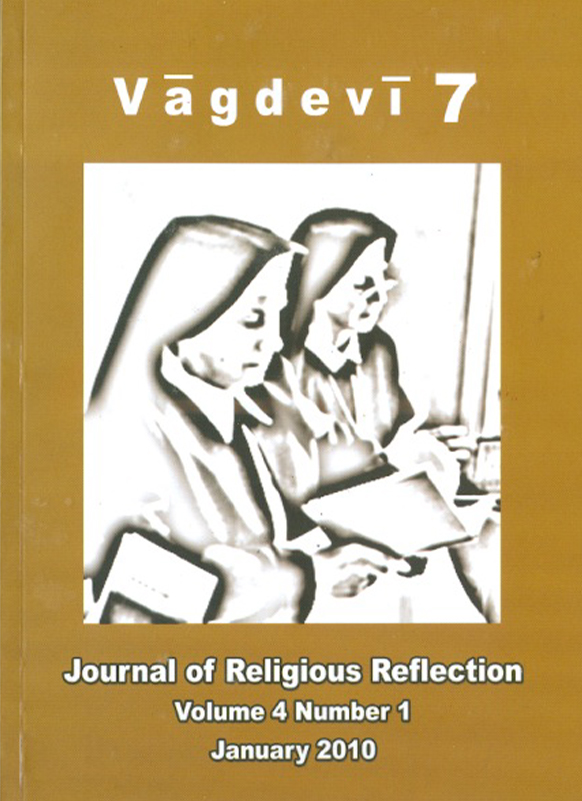
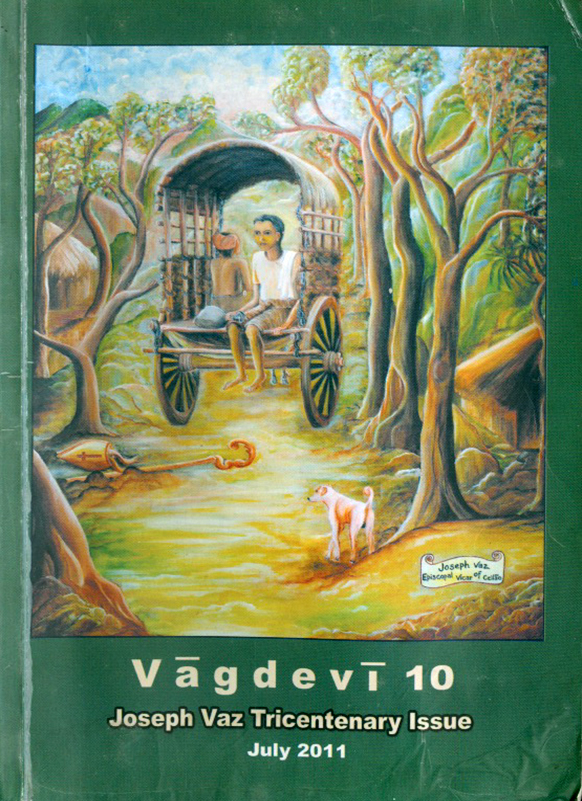
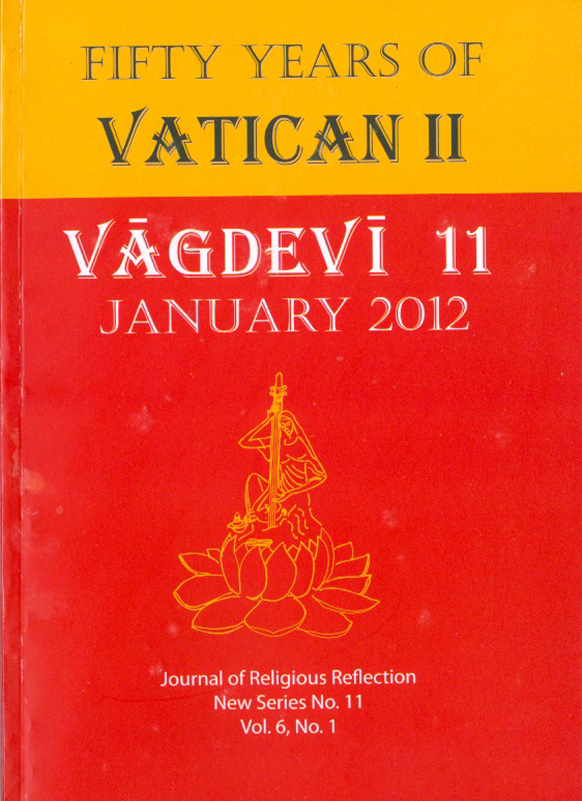
However, after about five years and thirteen issues later, the publication of JRR could not be sustained and the journal was to be discontinued. In the last 13th issue of August 2005, Fr. Paul Caspersz s.j. made the following plea;
“After discussion with my Jesuit Provincial, this issue of JRR will be the last issued by the present Editor. If anyone, female or male, Jesuit or other, is willing to continue editing it, may I please request her or him to contact my Provincial or me? The new Editor will have my support.
“Editing JRR since the year 2000 has been enjoyable. The trouble is that the enjoyment depended on the availability of much time and more energy. And these with each passing day have become increasingly scarce commodities.
“There is another reason. JRR receivers have not been as forthcoming as expected with their critical responses or with their subscriptions. After all, these are the acid tests of the worth of any publication. I do hope that the new Editor – if one is found – will receive the support and encouragement of more subscribers and more (even fiercely critical) responses.
“Readers, at least the Jesuit ones, of Issue No 1 of December 2000 may recall that the Message from the Jesuit Provincial at the time (Fr Baylon M. Perera) concluded thus: “Many years have gone by since we Jesuits made an option for Theological Reflection as a priority ministry in Sri Lanka. This seed, reviewed and repeated in annual assemblies., has fallen at last an good soil. We wish that, God willing, it yields a hundred-fold.”
Journal or no Journal, this theological reflection should go on in our country and in all the non-Christian world (and such is the Third World in which it is our God-given vocation to live).”
The challenge to continue publishing JRR was taken up by its new editor, Fr. Aloysius Pieris s.j., founder-director of the Tulana Research Centre for Encounter and Dialogue. In his Editorial for the first issue of the New Series (January 2007), which he called the “Trial Issue of the New Series”, Fr. Aloy wrote;
“The Journal of Religious Reflection (JRR) had almost folded up; its readers as well as its regular contributors had given up hope of seeing it revived; hence it was difficult for me as the new Editor to rekindle interest in the Review without bringing out this trial issue, which contains whatever I could gather at short notice:- articles, personal testimonies of spiritual and pastoral experiences as well as poetry. I invite prospective contributors to JRR to take a clue from the content, style and length of the pieces appearing in this issue. But it would not be over optimistic to expect more contributions coming in from the next number onwards. We hope to bring out two issues, one in January and the other in July of each year. We request that the contributions reach us at least two months before publication.
“The out-going editor, Paul Caspersz did not impose any restrictions on me as to how I should continue the JRR after him but he did insist that I adhere to his editorial policy of procuring and selecting articles that are practical and pastoral rather than overly academic. I assure him, and the readers as well, that I shall abide by his wise counsel without, however, compromising the scholarly seriousness for which he has been well known and which, therefore, should characterize the journal that he founded.
“When I proposed the idea of a Jesuit journal to our Jesuit Province a few years ago and went to the extent of suggesting that Fr Paul Caspersz be its editor, I had in mind Prajna Pitha as its title. The word means “Seat of Wisdom” (a Marian epithet), as well as “Chair of Philosophy”; it could even be extended to mean Theological Faculty taking a clue from St Damascene’s understanding of theology as sapientia/sophia. But Paul Caspersz had reasons for opting for the present title, which, therefore, will continue to be the official name of the journal. However, at a gathering of Sri Lankan Jesuits in September last year there was a suggestion that Prajna Pitha be revived as a Centre for Religious Reflection with the JRR as its organ. The Indic homologue of the Marian epithet, “Seat of Wisdom” (Prajna Pitha) is Sarasvati, also known as Vagdevi, the feminine manifestation of “God’s Word”, which biblically, is the Creative Wisdom by which all things came into being. This accounts for the appearance of the picture of Mary, Seat of Wisdom-Word on the cover, and Vagdevi as the subtitle of this journal. We hope this Journal for Religious Reflection will soon give birth to a Centre for Religious Reflection.
“The Jesuit Province of Sri Lanka will continue to bear the costs of printing, publishing and distributing the JRR, leaving the editorial responsibilities in my hand. However, I have invited Dr Shirley Lal Wijesinghe to assist me as Associate Editor. I am happy he has readily accepted my invitation.”
Eighteen issues of VAGDEVI have been published to date and the contents of each are given below;
VAGDEVI
Journal of Religious Reflection
(New Series)



